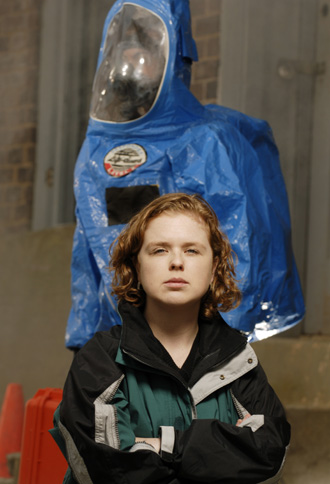 A Bomb in the Gym
A Bomb in the Gym
Are regional governments prepared for natural disasters, terrorist attacks, and pandemic disease? Erin McIntyre Eckert '00 has some answers.
Erin McIntyre Eckert wasn't sure what field she wanted to pursue after graduating from Kenyon with degrees in political science and economics. But she found her niche working at EnviroSafe, a company that helps regional governments and institutions prepare for emergency situations, where she plans, develops, and conducts disaster drills.
Walk us through a scenario you might use in a typical practice session.
The Carolina County 9-1-1 Center is suddenly overwhelmed with callers reporting explosions in the gymnasium at Carolina High School. Witnesses report that sections of the bleachers have collapsed and that there are small fires and extensive smoke throughout the building. One caller explains that the explosions occurred during a presentation by a local judge as a part of the school's career day. Early estimates are that more than two hundred and fifty students were present in the gym at the time of the explosion, but the extent of their injuries is unknown. Several fatalities have already been reported.
That sounds pretty stressful. Do people respond viscerally to these simulations?
Participants know they're only a part of a simulation, but stress levels [do rise] as responders begin to understand the challenges of coordinating their personnel and resources for such a large and complex event.
So, are most local governments and police and fire departments adequately prepared for disasters?
I would say, in general, no. The keys to being prepared are: one, having knowledge and experience; two, training; and three, exercise. All the things involved in being prepared involve money, and all the money out there is going toward risk, or perceived risk: New York, Los Angeles, Chicago. At the local level, at the smaller levels, if they get any money at all, it doesn't go very far. It's very hard to keep up-to-date. Equipment becomes obsolete, or you can't afford to replace it or repair it if it becomes broken. So you don't want to practice with it because then you ruin it; but if you don't practice with it, you're not prepared to use it. So a lot of it boils down to the fact that there's just not a lot of resources out there. You've got to do the best you can with what you have.
Do you have feedback on this page?
